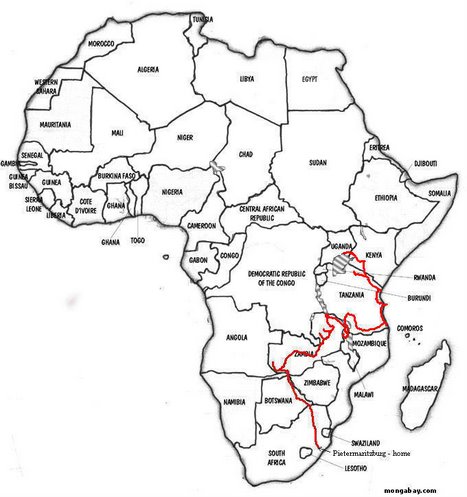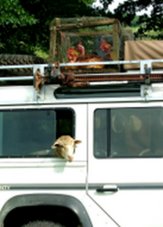Map of Africa

Our route
Thursday, October 18, 2007
Last BLOG from Africa
Thursday 18th October 2007 Ferry to Palermo Sicily
On the way to Tunis we passed through lovely flat farms, some irrigated where they are growing tomatoes, onion and the main crop being grapes, wheat and pomegranates. We drove straight to the ferry terminal to book for the crossing. It was 10.30 but nothing was open yet. At 11.15 they opened and even with Ahmed's assistance it took us an hour to get done. We intend to spend a lazy day in Tunis before boarding the ferry tonight at 8pm for the overnight trip. Ahmed says it will leave an hour or two late. This is after all Africa.
We don't have much more of Africa to see (this trip) and are looking forward to the bonus European section, half sorry to leave this wonderful and diverse continent which has taught us so much about people – others as well as ourselves and each other.
Wednesday 17th October 2007 Pomegranate Orchard Camp near Testour, Tunisia
We left the yacht club and traveled through semi mountainous terrain and a lot of poor farming. Cork Trees and Oaks covered the steep hills and gradually gave way to conifers, mainly Elliotii type pine trees, but short and stubby. The ground flattened with beautiful soils, irrigation with pivots and "T"&P (T=Tunisian) and traveling irrigation watering mainly wheat and lucerne. On the flats we found a large dairy farm which we visited. They milk 500 cows all in barns on a deep litter system using wheat straw as bedding. The cows (Frieslands) were good, but their feet were suffering as the passages hadn't been cleaned for days. They had a herringbone parlour and a large bulk tank. Most of the milk we have seen so far has been transported on bakkies between 2 and 10 cans per farmer. The cows were being fed wheat silage, which had to been chopped, maize silage again which hadn't been chopped finely with half-cobs in the silage, and green lucerne, also long chop. Our French was not good enough to distinguish between whether they averaged 30l or peaked at 30l.
We then proceeded towards Dougga which was in inland Roman city from early BC. Subsequent invasions by Ottomans, Vandalls, Berber etc have left their mark, but it is remarkable for the wonderful state of preservation of the whole town. The guide's family house had been built on top of the soil covering the ruins, and the families had to be relocated by Unesco once excavation was initiated in the 1960s.
Again the drainage, water-borne sewerage and piped water to every house from 12Km away through a system of reservoirs and then lead pipes into the houses amazed us.
We then headed for a campsite. We asked a farmer and he led us into a pomegranate orchard. We had to go over his plastic irrigation pipes.
At first Nev refused, but he was insistent in his 'no problem" response (the only English words they know), and only once we were in situ and he had brought us a whole lot of pomegranates that we thought (worried) that maybe he didn't like his neighbour and let us run over his neighbour's irrigation pipes, given us all his neighbour's pomegranates and we were hoping the neighbour wouldn't appear to find us scoffing his fruit, squashing his pipes and making ourselves at home in his orchard. However all turned out well. The farmers here have huge farms of pomegranates (we have found them a bit insipid).
On the way to Tunis we passed through lovely flat farms, some irrigated where they are growing tomatoes, onion and the main crop being grapes, wheat and pomegranates. We drove straight to the ferry terminal to book for the crossing. It was 10.30 but nothing was open yet. At 11.15 they opened and even with Ahmed's assistance it took us an hour to get done. We intend to spend a lazy day in Tunis before boarding the ferry tonight at 8pm for the overnight trip. Ahmed says it will leave an hour or two late. This is after all Africa.
We don't have much more of Africa to see (this trip) and are looking forward to the bonus European section, half sorry to leave this wonderful and diverse continent which has taught us so much about people – others as well as ourselves and each other.
Wednesday 17th October 2007 Pomegranate Orchard Camp near Testour, Tunisia
We left the yacht club and traveled through semi mountainous terrain and a lot of poor farming. Cork Trees and Oaks covered the steep hills and gradually gave way to conifers, mainly Elliotii type pine trees, but short and stubby. The ground flattened with beautiful soils, irrigation with pivots and "T"&P (T=Tunisian) and traveling irrigation watering mainly wheat and lucerne. On the flats we found a large dairy farm which we visited. They milk 500 cows all in barns on a deep litter system using wheat straw as bedding. The cows (Frieslands) were good, but their feet were suffering as the passages hadn't been cleaned for days. They had a herringbone parlour and a large bulk tank. Most of the milk we have seen so far has been transported on bakkies between 2 and 10 cans per farmer. The cows were being fed wheat silage, which had to been chopped, maize silage again which hadn't been chopped finely with half-cobs in the silage, and green lucerne, also long chop. Our French was not good enough to distinguish between whether they averaged 30l or peaked at 30l.
We then proceeded towards Dougga which was in inland Roman city from early BC. Subsequent invasions by Ottomans, Vandalls, Berber etc have left their mark, but it is remarkable for the wonderful state of preservation of the whole town. The guide's family house had been built on top of the soil covering the ruins, and the families had to be relocated by Unesco once excavation was initiated in the 1960s.
Again the drainage, water-borne sewerage and piped water to every house from 12Km away through a system of reservoirs and then lead pipes into the houses amazed us.
We then headed for a campsite. We asked a farmer and he led us into a pomegranate orchard. We had to go over his plastic irrigation pipes.
At first Nev refused, but he was insistent in his 'no problem" response (the only English words they know), and only once we were in situ and he had brought us a whole lot of pomegranates that we thought (worried) that maybe he didn't like his neighbour and let us run over his neighbour's irrigation pipes, given us all his neighbour's pomegranates and we were hoping the neighbour wouldn't appear to find us scoffing his fruit, squashing his pipes and making ourselves at home in his orchard. However all turned out well. The farmers here have huge farms of pomegranates (we have found them a bit insipid).
Subscribe to:
Post Comments (Atom)

No comments:
Post a Comment